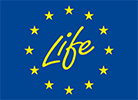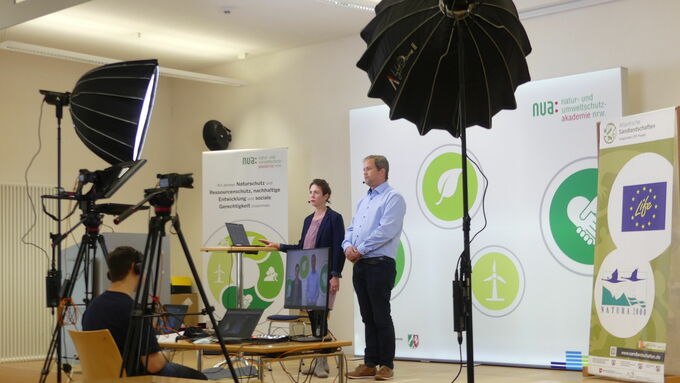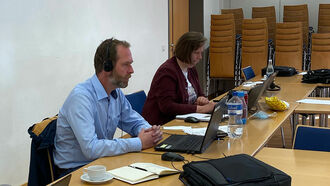The moderators of the event, Saskia Helm (NUA) and Dr Sebastian Schmidt (Bezirksregierung Münster) on the stage set up in the North Rhine-Westphalian academy for nature and environment conservation. © Dr. Martina Raffel/Bezirksregierung Münster
download picturemain content
Project of the month
# 10/2021 ONLINE MIDTERM CONFERENCE
Natura 2000 in climate change – conservation objectives and measures in a changing climate
On 30th September – fittingly for the halfway party of the project – the LIFE IP held an online conference in cooperation with ‘Natur- und Umweltschutzakademie NRW’ (North Rhine-Westphalian academy for nature and environment conservation, NUA). The event which was intended to discuss the influence of climate change on the provisions of Natura2000, also served as a mid-term conference for the exchange of experiences of all project participants and interested parties. About 130 participants had registered for this event. According to the online survey at the beginning, the majority came from North Rhine-Westphalia (60 %), 27 % from Lower Saxony and 12 % from other federal states. Furthermore, most of the participants were involved in nature conservation on a voluntary or full-time basis (40 %), employed in a state authority (23 %) or in a municipal authority or city administration (20 %).
After the short welcoming speeches by Dr Christoph Leifer, Deputy Head of Department III (Forests, Nature Conservation) in the Ministry for Environment, Agriculture, Conservation and Consumer Protection of the State of North Rhine-Westphalia, and Ingelore Hering, Head of Department Nature Conservation, Water Management, Soil Protection in the Ministry for Environment, Energy, Building and Climate Protection of Lower Saxony, there followed a brief presentation of the LIFE IP by project manager Dr Sebastian Schmidt from the District Government of Münster.
The three following expert presentations were opened by Prof. Dr Marianne Darbi who holds a professorship for landscape planning and impact management at the Institute for Landscape Planning and Nature Conservation at Geisenheim University. In her presentation of about 30 minutes, she got to the heart of how climate will change our landscape and biodiversity and presented possibilities for regulation.
Susanne Brosch from the Lower Saxony Water Management, Coastal Defence and Nature Conservation Agency (NLWKN) presented a practical report from a LIFE project that strongly serves climate protection. As project manager of the LIFE+ project ‘Hannoversche Moorgeest’ in Lower Saxony, she explained why the protection and restoration of raised bogs is also climate protection. The decisive factor for the climate relevance of the planned measures are the groundwater-surface distances. Effective CO2 fixation can only take place if these are between 0 and -10 centimetres.
The topic was examined from a completely different perspective in the presentation by Jochen Schumacher from the Institute for Nature Conservation and Nature Conservation Law in Tübingen. His presentation entitled ‘Legal certainty in the implementation of funding guidelines’ outlined the legal aspects of the question to what extent conservation objectives and management plans are flexibly adapted to changing distribution areas and further processes. In particular, the need to prevent deterioration was discussed in the subsequent discussion. In order to cope with the consequences of climate change, it will often be necessary to review protection objectives, management plans or bans and permits in existing protected areas.
In the subsequent expert corner, the three experts – Frank Vassen from the EU Commission (Unit ENV,D3 - Nature Protection), Dr Axel Ssymank from the Federal Agency for Nature Conservation (Division II, Section II 2.2 Habitat Directive / Natura2000) and Dr Michael Luwe from MULNV NRW (Unit III-4 Biodiversity Strategy, Species Protection, Habitat Conservation, Contractual Nature Conservation) – first introduced themselves and their fields of work and answered the questions of the moderators and from the participant chat. Frank Vassen was particularly asked about the EU Biodiversity Strategy 2030 and the ‘Green Deal’, about EU requirements and the differences between integrated LIFE projects and the future so-called SNAPs. Axel Ssymank explained the perspective from the national level, while Michael Luwe looked at the implementation of the Habitats Directive from the practice of a federal state. In the chat, questions raised were mainly on the topic of forest conversion, rewetting of bogs and possible consequences of a deterioration of the conservation status for recipients of funds.
Slam poet Lars Ruppel concluded the official programme with a successful poetic recording. Afterwards, numerous participants met in the open chat and virtual conference room for personal or group discussions.
Many thanks to all participants for their contributions and their active participation in the event!





